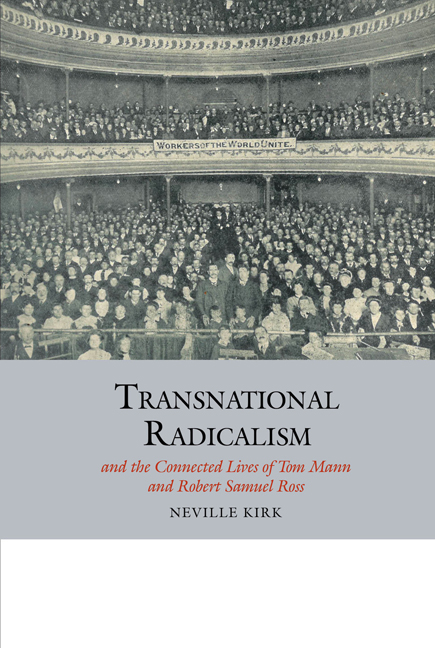Conclusion
Summary
The last chapter ended by considering the successes and failures of Mann and Ross during the period of World War I and its aftermath. The ‘Conclusion’ extends this focus by means of a summary of the successes and failures and strengths and weaknesses of my two subjects in terms of their stated objectives and political careers as a whole. These, we may recall, were to develop the appeal and strength of labour movements, radicalise workers and achieve socialism by means of the peaceful Social Revolution nationally, internationally and transnationally. The ‘Conclusion’ then moves to an appraisal of the relationship between Mann's and Ross's transnational, global, international and national allegiances and identities. It offers a brief final word on the relevance of Mann and Ross to today's radicals.
While Mann and Ross failed in their overriding objective to achieve the Social Revolution in their lifetimes, they nevertheless registered several successes in terms of the development of labour movements and the promotion and cultivation of radicalism. Both were very impressive working-class autodidacts and organic labour intellectuals,1 who, especially as ‘knowledge producers’, ‘militant-minority’ leaders and practitioners in labour institutions, made a significant contribution, above all else, to the development of radical and socialist ideas, practices, connections and networks in Britain, Australasia and the wider British and Anglophone worlds. Mann's contributions and influences were global in character.
Employing a fine blend of theory and practice, Mann and Ross editorialised, propagandised, educated, organised and consistently attempted to relate abstract ideas and practices to the practical issues faced by working people in their daily lives. While Ross, as journalist, editor, writer and reviewer, excelled as an ‘ideas’ man’, Mann's true genius lay not only in his writing and powers of encouragement and persuasion, but also, and perhaps above all else, in his oratorical and organisational skills within the ranks of the skilled and non-skilled sectors of the labour force. In fact, he may be judged to have been one of the best speakers, propagandists, syndicalists and industrial organisers, especially of ‘new’ mass trade unionism, nationally, internationally and transnationally, in the history of labour movements globally.
- Type
- Chapter
- Information
- Publisher: Liverpool University PressPrint publication year: 2017

